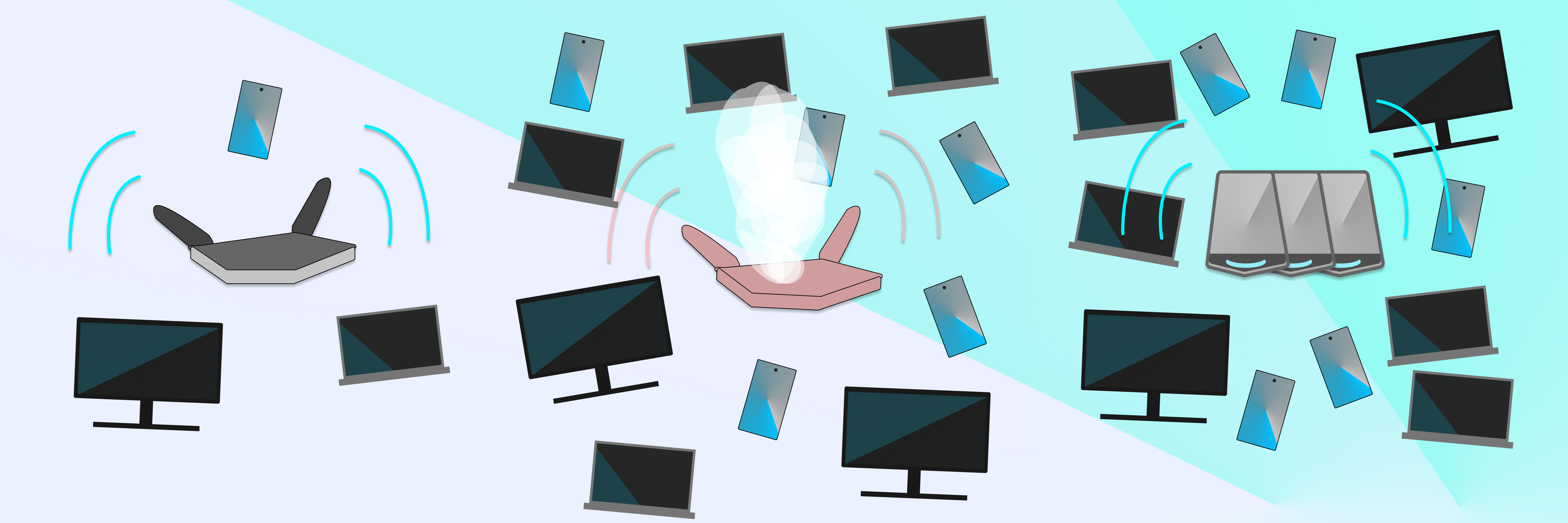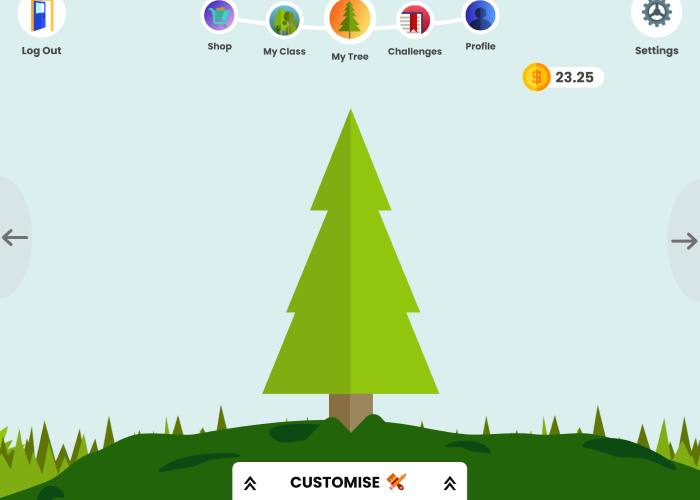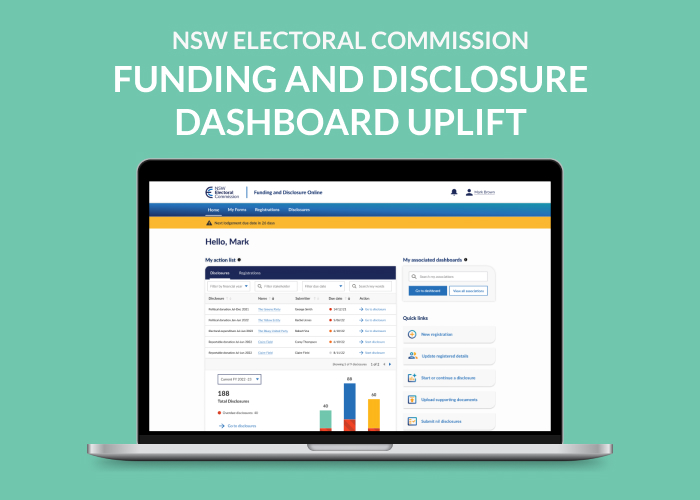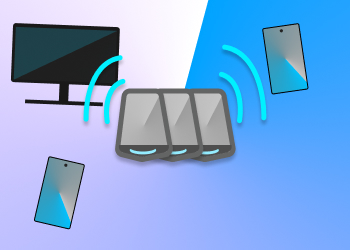Improve your Internet
Daniel Bismire
2 month project conducted by myself during 2021, at nbn in the Digital UX team.
This report will demonstrate my work on improving nbn’s optimise experience. This includes using the double diamond methodology. From the discovery phase, define, develop and deliver to the final solution.
Improving your internet Experience is my solution to the issues made clear by primary and secondary research. Optimisation needed an overhaul to solve key user issues and get them the relevant information to get their internet fixed/improved in a timely manner.
My proposed solution is a one page user journey for learning and troubleshooting their internet, to achieve a better experience. This journey will help users go through step by step process of elimination and give them guidance opportunities to improve their internet. THis journey will help users solve their internet needs, relieving frustration, and improving their internet needs.
My Role
The Objective
Design the core strategic component of the connected customer refresh, Optimise to be a helpful and engaging experience. This includes the Optimise landing page itself, and its child pages ( Steps to boost your Wi-Fi, Choosing the right speed, Tips for your home and Office). The objective in particular, is to reduce cognitive load of pages, allow users to flow between pages easily and solve their needs. feel empowered to fix/optimize their internet with no fuss and leave the page satisfied.
Overview
nbn build is now complete, there is a focus on maintaining users and providing support on their internet. This project is refreshing the public website to better cater towards Connected Customer refresh key four scenarios (Connect, optimise, upgrade & support ), and to implement end-to-end Digital Customer Journeys that specifically target nbn’s CX and revenue objectives with a focus on high-speed tiers. Focusing on the end users trust, relatability, time and control
Discover
Past research on optimize demonstrated that: Optimise and its child pages tested positively with the populace based on previous research studies on the nbn website. Users liked the layout of the pages themselves, in particular the chunking of content. The first round of user testing only showed minor issues with the pages however with further discovery I discovered ways to improve optimise
Heuristic Evaluation
To start off this process I examined the current optimise experience myself to immerse my self in the experience. I gave myself three tasks to complete. This allowed me to examine the possibilities to enhance product usability from early in development.
Three tasks
- I want to boost my wifi, - I want to discover what speed would suit me. - Further I want to discover tips for home and office setups
Findings
Interviews
Next I conducted Interviews with 8 participants from different demographics in Australia. These interviewees were given abstract/concrete tasks based on using optimise. These included tasks such as:
Key User Quotes
“Optimisation is hard to find. I have no idea where to start. It is not clear if it is in learn, residential or the home page.” “So much reading. Having to read so much content to get to the facts, when you just want to skim. ” “It is a lot easier for me if I google search ‘nbn optimise’, instead of navigating to it on the nbn website.” “The optimize experience feels too separated.”
Affinity Diagram Synthesis
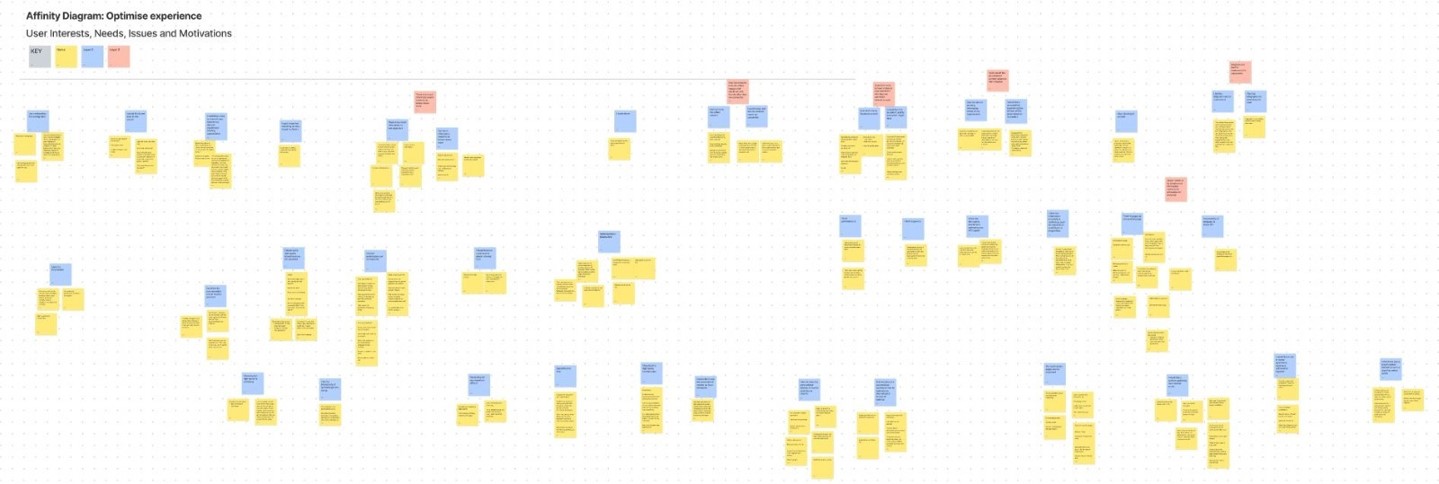
Top Insights
Criteria for Success
>From gathering the insights I came up with a criteria for success in order to improve optimise for the better.
There needs to be simple to understand visuals and information The solution needs to be explained well and solve key user scenarios There has to be a connected flow The experience should be easy to start and find To retain information there needs to be interaction and/or personalisation
Problem Statement
Many users do not come to the nbn website for support, if they do they struggle to find optimisation and it’s child pages. They face inconsistent layouts, poor flows, difficulty to find, hard to understand diagrams, tedious clickables and they have to sift through information to find their answer which gives them frustration. We need to overhaul this experience to solve key user issues and get them the relevant information to get their internet fixed/improved in a timely manner.
Ideation
Crazy 8's
After receiving valuable insights I started to brainstorm ideas utilising to crazy 8 method. This is conducted by creating rough sketches of ideas in under a minute each.
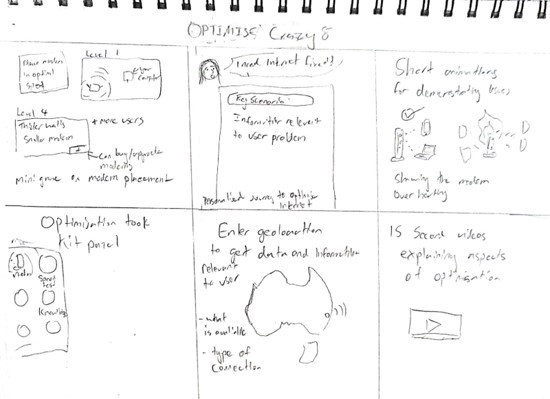
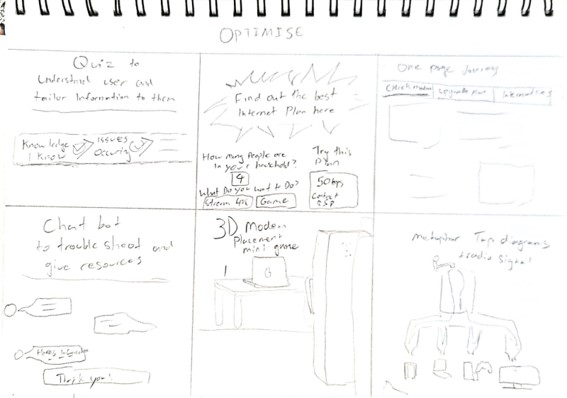
These included ideas on chat bots, 3D modem placement mini game, metaphors for explaining wi-fi modem setups, one page journeys, quizlets, a tool kit to troubleshoot internet, geolocation based information, 15 second shorts on explaining information and a tool to find what plan suits a household best.
DFV Criteria
A Desirability, Variability and Feasibility Criteria. Due to the nature of work, I had to be grounded with the ideation, and examine reasonable solutions that will be wanted, not too difficult to implement and be on a lower maintenance level. This led to a significant amount of ideas being culled and absorbed into larger/smaller ideas.
I nicknamed my solutions and scaled them from 1-10 based on each criteria in the DFV.

Potential Solutions after a DFV Criteria
Potential Solutions 1: Tailor Made
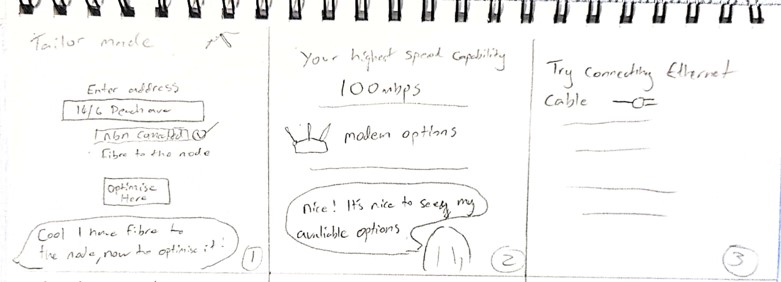
This solution would allow the user to be able to check their address and receive information based on the connection they have (adjusting information to their needs/geolocation). This will give the user personalised tools and information for troubleshooting and improving their internet.
Potential Solutions – Short Snippets
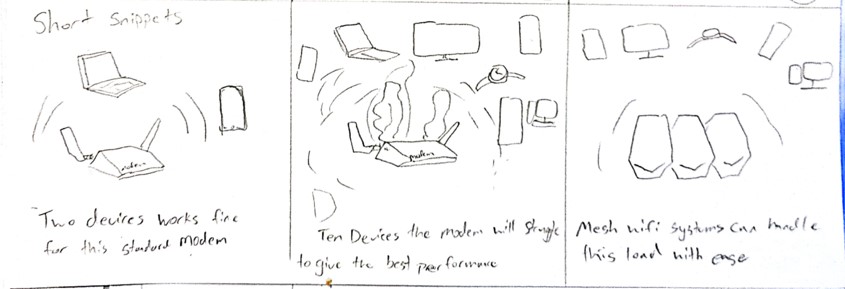
This solution aims to give users quick bite size chunks of information.. This can consist of short videos or animated gifs that explain a concept to the user. This can save the user time having to sift through pages themselves to find the relevant information.
An example of this is a wifi modem overheating, when the user connects more devices, the modem will struggle with the increased load, demonstrating the worse the user's internet is going to perform. The user can avoid this by upgrading their modem to a more advanced modem such as a wi-fi mesh system.
Improve your Internet Starts Here
This solution rated strongest against the DFV criteria, due to the ease of implementation by reusing existing components in our design system. Further it was low maintenance and gave a clear overview of what users can perform in order to improve their internet.
‘Improve your Internet Starts Here’ Is a one page singular journey that starts with a key user scenario and caters information to that key scenario. The journey would be located as a clear tile on the homepage as users struggled to find Optimise and its child pages. The key scenarios include common google searched questions such as “I want my video to stop buffering” and “my internet is slow what do I do?”, Once the user chose their scenario they would receive a high level overview using a stepper and progress bar on ways to improve their internet. Some solutions included moving the modem closer, changing speed plans, upgrading the modem and much more. At the end of the experience, the user would receive a review/summary on actions they need to take.
Prototyping
Paper Prototype
I sketched up the journey using pen and paper for an immediate cost-effective testing method to assess the ease and usefulness of the design idea
The paper prototype features several new experiences, the first is a ‘place your modem’ mini game, this teaches users on the ideal placement of technology in the house and further educates them on wifi meshes and extenders. The second is a speed test calculator, the user can input how many users there are in the household, how many devices they have, how often they use all at the same time, the type of activities they conduct using the internet and finally the type of connection they have. This calculator would inform the user on the type of plan that would suit their needs and give links to retail service provider options.
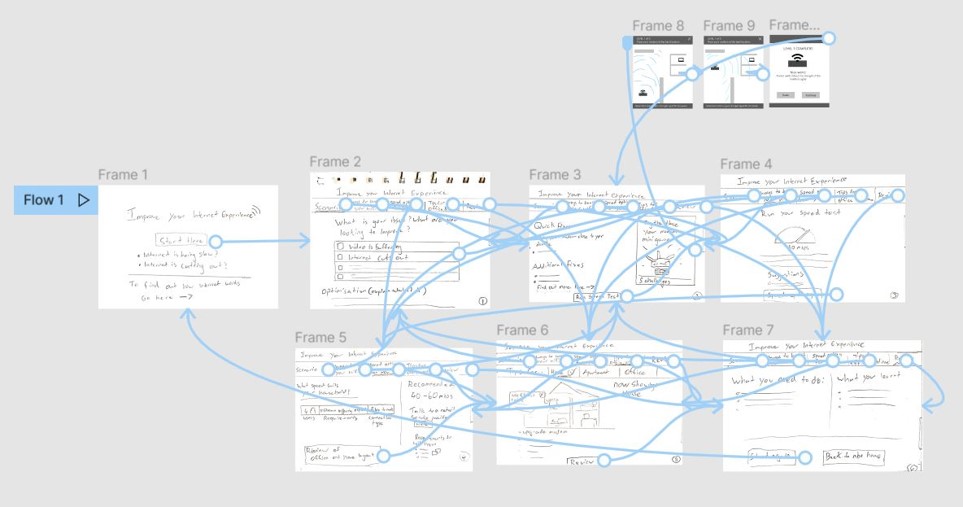
User Testing
6 Participants from the initial discovery interviews
Insights
One page journey flow works well and is straight to the point. “I like how it flows, you always have next steps if you can not solve a problem. I can keep going until I find the answer.” “If the speed is bad then I know its the modem so I want to see if there are upgrade options available.” The prototype requires a review as the order currently is confusing. There needs to be more of a process of elimination rather than a combination of the optimise pages. The 'What you have learnt' section requires a change as not everyone might have learnt something. The place your modem mini game is useful and engaging however it should be optional. "I like the mini game, I think the digitally illiterate likes the confirmation on their learning. It is a good way to confirm, as it explains, then says let try this together, then try on your own." Users praised the speed test calculator. “I love how it reverses the order in finding the right plan.”
New User Flow
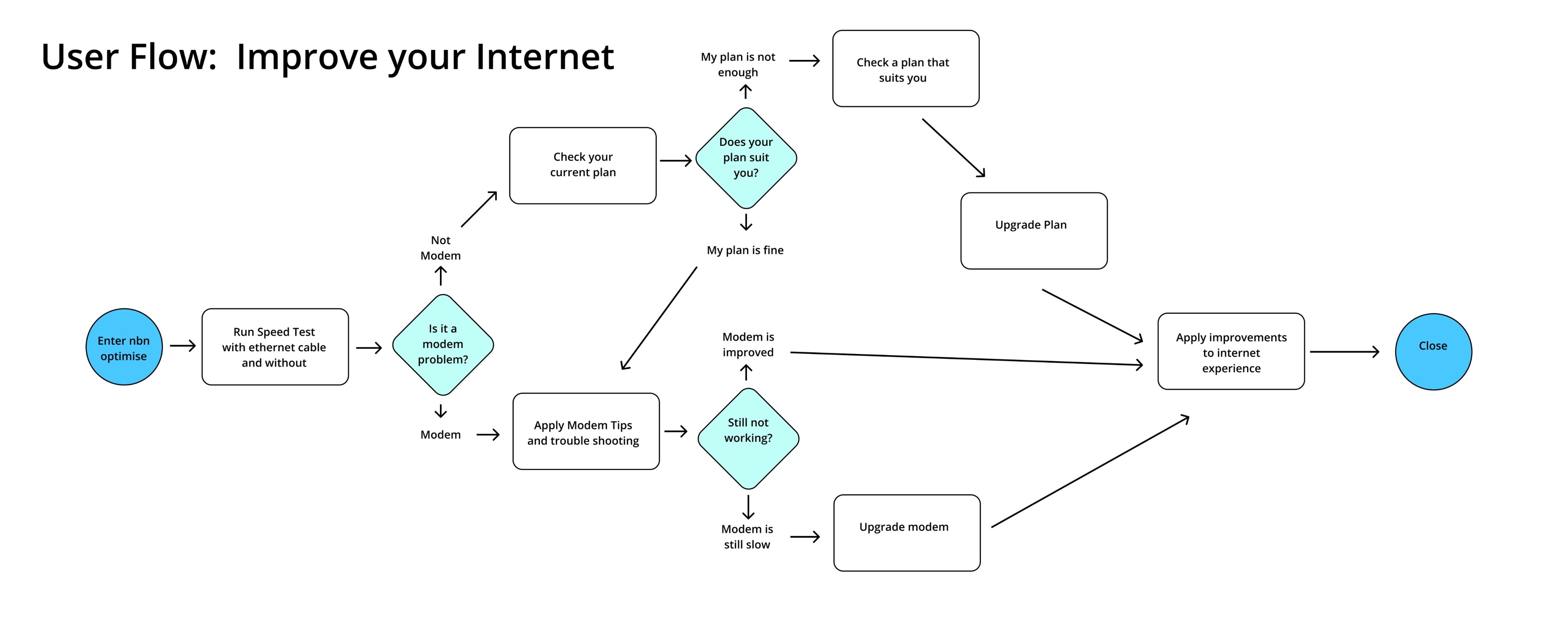
Two user groups:Users who would like to learn about Optimisation Users who would like to troubleshoot their internet
A new user flow was created to reflect the reordering of content from the paper prototype testing. The new flow showcases the extent of what the Optimise experience can achieve. This flow however does not solve for network drop outs, retail service provider issues, nbn cable installation issues. The user would be informed on the extent of what they can and cannot achieve in this experience.
Mid Fidelity
Mid fidelity changes

The Solution
What does Improving your internet solve for?
Users are able to examine ways they can improve their internet. This updated experience assists users to understand if they need a new modem or a better plan. This experience will help users understand if they are receiving the speed that they are paying for and inform them of a plan that would suit their household needs. This experience provides quick fixes for users to improve their internet connection. A modem placement game is provided to teach users about wifi modem locations, interferences, wifi extenders, wifi mesh and modem signals. Improving your internet experience further teaches users about modem device age, capacity and upgrade options. The user is able to find a plan speed that would suit them by entering their requirements (number of users, devices, requirements and their connection type.) The user can use interactive diagrams that inform them of optimising their place of residence. Users can receive a quick review on what they need to check and why. This includes their speed, plan, modem and devices connected, ensuring that they have the best internet experience.
The Screens
Speed calculator

